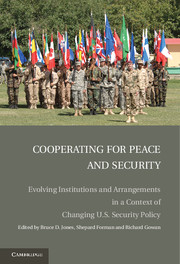 Cooperating for Peace and Security
Cooperating for Peace and Security Book contents
- Frontmatter
- Contents
- Contributors
- Foreword
- Acknowledgments
- I FRAMEWORK
- II ADAPTING COLD WAR INSTITUTIONS
- III NEW TOOLS, NEW MECHANISMS
- 10 Normative Evolution at the UN: Impact on Operational Activities
- 11 Constructing Sovereignty for Security
- 12 New Arrangements for Peace Negotiation
- 13 International Humanitarian Cooperation: Aiding War's Victims in a Shifting Strategic Environment
- 14 The Evolution of Regional and Subregional Collective Security Mechanisms in Post–Cold War Africa
- 15 International Courts and Tribunals
- IV CONCLUSIONS
- Index
- References
11 - Constructing Sovereignty for Security
Published online by Cambridge University Press: 22 January 2010
- Frontmatter
- Contents
- Contributors
- Foreword
- Acknowledgments
- I FRAMEWORK
- II ADAPTING COLD WAR INSTITUTIONS
- III NEW TOOLS, NEW MECHANISMS
- 10 Normative Evolution at the UN: Impact on Operational Activities
- 11 Constructing Sovereignty for Security
- 12 New Arrangements for Peace Negotiation
- 13 International Humanitarian Cooperation: Aiding War's Victims in a Shifting Strategic Environment
- 14 The Evolution of Regional and Subregional Collective Security Mechanisms in Post–Cold War Africa
- 15 International Courts and Tribunals
- IV CONCLUSIONS
- Index
- References
Summary
The December 2004 report of the United Nations (UN) Secretary-General's High-level Panel on Threats, Challenges, and Change proposed the establishment of an intergovernmental Peacebuilding Commission to oversee UN operations to rebuild states after armed conflict. This commission would exercise budgetary authority over a Peacebuilding Fund, which would be kept fully replenished in advance of operations and would contain nonearmarked contributions. A Peacebuilding Support Office within the UN Secretariat would support the commission.
In the aftermath of war, international actors often fret about the incoherence, tribalism, and division of war-torn countries. The High-level Panel's recommendations, however, recognize that the divisions, rivalries, and fragmentation of authority of the “international community” have constituted just as big an obstacle to what the UN calls “peacebuilding.” The creation of a unified, multilateral decision-making body as a counterpart for the national government receiving the aid could finally make it possible to implement the Brahimi Report's recommendation for “integrated missions.”
Although political sensitivities prevented the panel from using the term “statebuilding,” such operations have the paradoxical mission of helping others build sovereign states. They constitute the contemporary version of a long-standing security task – the stabilization of the periphery by Great Powers – which now must be carried out in a world governed by the universal juridical sovereignty of the nation-state. Even the administration of U.S. President George W. Bush, which adopted a doctrine of preventive war on the basis of unilateral judgment that governments might threaten U.S. security, was constrained to act within the same regime.
- Type
- Chapter
- Information
- Cooperating for Peace and SecurityEvolving Institutions and Arrangements in a Context of Changing U.S. Security Policy, pp. 215 - 226Publisher: Cambridge University PressPrint publication year: 2009
References
- 1
- Cited by


